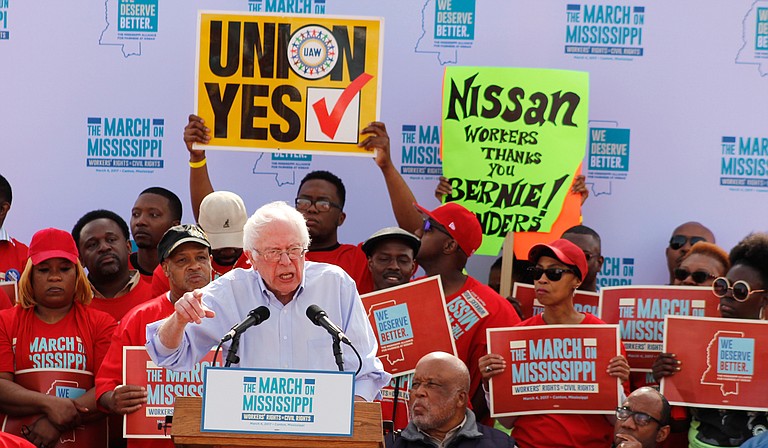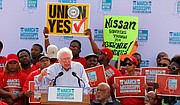U.S. Sen. Bernie Sanders, I-Vermont, spoke at the March on Mississippi in Canton on Saturday, March 4, supporting efforts of some workers at the Nissan plant to unionize. Photo by Arielle Dreher.
Monday, July 17, 2017
JACKSON, Miss. (AP) — Only days old, the union election campaign at Nissan Motor Co.'s Canton plant is already heating up.
Among the key questions:
— Can the United Auto Workers union use a civil rights-inflected pitch to win over the majority of the plant's workers, who are mainly African-American?
— Will outside business and anti-union groups intervene the way they did at the Volkswagen AG plant in Chattanooga, Tennessee?
— Will Nissan be able to run a strong anti-union campaign inside the Mississippi plant without sparking a backlash in other countries where it does business?
The UAW asked for a relatively quick election on July 31 and Aug. 1, but that decision is ultimately up to the National Labor Relations Board. The UAW says about 4,000 workers should get to vote, including employees of Nissan, but not of contract worker agencies Kelly Services and Minact.
The union has been trying to build employee support for years, as it seeks a crucial win at a foreign-owned auto plant in the South. A rally in March spearheaded by former Democratic presidential hopeful Bernie Sanders and others proclaimed that "Workers' rights equal civil rights," a theme that has also undergirded efforts to build support for the union among African American leaders in Mississippi.
Already on Friday, the Mississippi Manufacturers Association released a statement by President Jay Moon slamming the UAW and praising Nissan.
The UAW has put local workers at the forefront of its campaign, which has often focused on respect and workplace quality-of-life issues such as safety and scheduling more than wages, benefits and pensions. Moon, though, says a shrinking UAW want to represent Nissan workers to get its hands on union dues, a common claim by union opponents.
"Make no mistake — this campaign is not about the hard working Mississippians at Nissan — this is about a self-serving outsider campaign by a UAW desperate to survive," Moon wrote. "Fewer members mean fewer dues and the UAW has to do something. They see Nissan workers' paychecks as their final lifeline."
Pro-UAW workers say the election is about giving them a voice, never mentioning dues.
It's unclear if Moon's statement is the opening salvo of an aggressive outside messaging campaign like the one seen in Tennessee when workers voted on UAW representation at Volkswagen in 2014. There, Republican state officials threatened to withhold future incentives from a unionized plant, and U.S. Sen. Bob Corker said during voting that Volkswagen would reward the plant with a second assembly line if workers rejected the union, which they did.
Such a massive campaign may be unneeded in Mississippi. Early indications are that Nissan is making an aggressive case for the non-union status quo. Spokeswoman Parul Bajaj said the company would exercise its rights to present information to employees
"Nissan Canton's success has been built upon the direct relationship we have with employees, and, given the UAW's history of layoffs and job closures, their presence could harm the plant's global competitiveness," she wrote last week, laying the blame for the failings of the Detroit Three automakers at the feet of the UAW, not managers.
A union text message to supporters on Wednesday announced that "Nissan's anti-union campaign of meetings with workers has begun."
The UAW has been running a global campaign against Nissan, unsuccessfully trying to pressure the company to declare itself neutral in the organizing drive. The UAW has focused lately on France, where sharp anti-union rhetoric is outside the political mainstream. And politics matter there, because the French government owns nearly 20 percent of the Renault Group, Nissan's business partner. There's probably little the French government can do to cool union opposition by Nissan managers in coming weeks, but there could be long-term fallout.


Comments
Use the comment form below to begin a discussion about this content.
Sign in to comment
Or login with:
OpenID